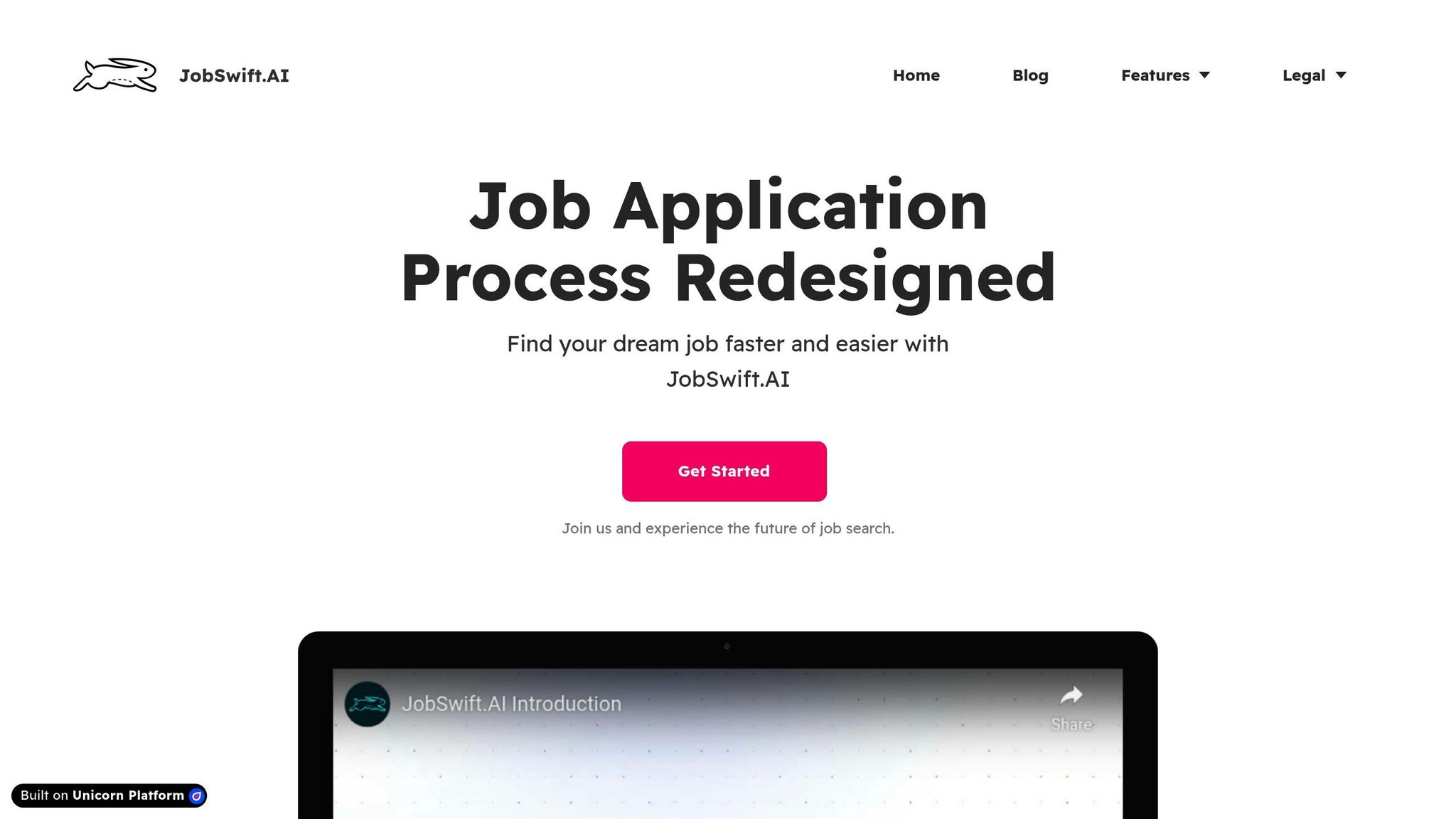AI is transforming hiring, but privacy concerns are growing. Over 90% of HR professionals in the U.S. now use AI for recruitment, speeding up processes but raising ethical and legal issues. Here's what you need to know about protecting candidate data:
- AI Screening Risks: Handles vast amounts of personal data, increasing risks of breaches and bias.
- Data Privacy Laws: U.S. privacy regulations like the CCPA and ADA aim to prevent discrimination and ensure transparency.
- Best Practices for Recruiters: Focus on consent, data minimization, encryption, and regular audits.
- Job Seeker Tips: Understand your data rights, limit personal details, and use trusted platforms.
Whether you're hiring or applying, safeguarding privacy is essential to build trust and avoid legal risks. Dive in for actionable steps to protect candidate data while leveraging AI effectively.
AI + Hiring: How Algorithms Decide Jobs - Recording
Data Privacy Principles for AI Screening
Ensuring data privacy in AI-driven screening processes hinges on three key principles. These principles not only protect candidates but also maintain ethical hiring practices, fostering trust between companies and potential employees.
Consent and Clear Communication
Consent is a cornerstone of ethical AI screening. Employers must inform candidates upfront about the use of AI in the hiring process and obtain explicit permission before proceeding. This means clearly explaining what data will be collected, how it will be analyzed, who will have access to it, and how long it will be stored. By being upfront, companies demonstrate respect for candidate privacy and build trust.
For instance, when conducting video interviews, it’s important to notify candidates about AI involvement and secure separate consent. Clearly outline the purpose of using AI and how it benefits the hiring process.
Additionally, companies should aim to collect only the data necessary for hiring decisions and anonymize it whenever possible to further safeguard privacy.
Data Minimization and Anonymization
Data minimization involves collecting only the information that is absolutely necessary for the hiring process. This approach reduces privacy risks and minimizes potential damage in case of a data breach. Key practices include limiting data collection to what’s essential, restricting access to authorized personnel, avoiding unnecessary data sharing, and deleting data once it’s no longer needed.
Anonymization provides an extra layer of security by altering personal information so that it cannot be linked back to an individual, while still allowing for analysis. A 2023 Gartner survey revealed that 85% of organizations using AI in recruitment have adopted anonymization techniques. This method is generally more secure than pseudonymization, which only partially obscures the connection between data and individuals.
In practice, anonymization can take various forms. Some companies remove identifiable details like names and contact information from resumes, while others use advanced methods to obscure demographic data while retaining critical information about skills and qualifications. Following these practices not only meets ethical expectations but also aligns with changing U.S. privacy laws.
Security Measures for Candidate Data
Beyond consent and data minimization, implementing strong security measures is crucial to protect sensitive candidate information. With cyberattacks on HR systems expected to increase by 30% annually, safeguarding data is more important than ever.
Companies can enhance security by encrypting data both in storage and during transmission. For example, platforms like LinkedIn and SmartRecruiters use end-to-end encryption to ensure intercepted data remains unreadable without decryption keys. Role-based access controls and regular permission reviews further limit who can access sensitive information.
Continuous monitoring and regular audits also play a critical role in maintaining security. Organizations that conduct annual privacy audits are 35% less likely to experience major data breaches. Automated data deletion policies, such as those offered by SAP SuccessFactors, allow candidates to manage their data - previewing, downloading, or permanently deleting it in line with privacy laws.
The financial stakes for failing to secure data are high. GDPR fines, for example, have grown by 168% annually, with penalties exceeding €2.92 billion since 2018. To reinforce security, companies like Microsoft publish annual reports detailing their AI ethics policies, data protection efforts, and any incidents involving breaches or bias.
As Jeffrey Zhou, CEO & Founder of Fig Loans, notes:
"To ensure our AI decisions align with ethical standards and compliance requirements, we established an internal AI Ethics Board. This board is made up of diverse personnel from different departments that meet on a regular basis to assess AI-driven hiring decisions. They offer a variety of opinions, ensuring that our AI is not just compliant, but also equitable and inclusive."
Legal and Ethical Requirements for AI Screening
Navigating the legal and ethical landscape of AI screening is critical for recruiters and job seekers. As technology advances faster than legislation, understanding the current rules and emerging regulations helps ensure fairness and compliance in AI-driven hiring processes.
Understanding U.S. Privacy Laws
Unlike the European Union, which has established comprehensive AI regulations, the United States relies on a mix of existing anti-discrimination laws and emerging state-level legislation to govern AI in recruitment. Federal laws such as Title VII of the Civil Rights Act of 1964, the Americans with Disabilities Act (ADA) of 1990, and the Age Discrimination in Employment Act (ADEA) of 1967 apply to AI-based hiring tools. The Equal Employment Opportunity Commission (EEOC) has reinforced this by stating:
"Employers are accountable for any hiring decisions made by an algorithmic decision-making tool and cannot place blame on the software vendor as a legal defense."
State and local governments are also stepping up. In 2024, over 400 AI-related bills were introduced across the U.S. - a sixfold increase from 2023. Illinois, for instance, enacted the Artificial Intelligence Video Interview Act, requiring companies to obtain consent before recording interviews, inform candidates about AI usage in assessments, and disclose the traits being analyzed. Candidates can also request that their recordings and analyses be deleted within 30 days.
California is expected to expand its AI regulations in 2025, building on the California Consumer Privacy Act (CCPA), which already allows job applicants to access, correct, or delete their data. Organizations that fail to comply with these evolving laws face serious financial and legal consequences.
Preventing Bias in AI Screening
Eliminating bias in AI screening requires proactive strategies and constant vigilance. Companies are addressing this issue by using fairness-aware ranking systems, bias detection tools, and diverse training datasets, alongside routine audits.
Key steps to reduce bias include training AI models with datasets that reflect the diversity of the talent pool and conducting regular audits to identify and correct potential biases. Organizations should also choose AI tools from vendors that have passed independent bias evaluations.
Human oversight is equally important. AI should support - not replace - human decision-making. By reviewing AI-generated results and making necessary adjustments, human reviewers can help prevent the exclusion of qualified candidates. Collaboration across HR, legal, and technology teams ensures compliance with employment laws and ethical hiring standards. Many companies are now forming AI ethics committees to oversee these efforts and guide responsible hiring practices.
Candidate Rights and Access
AI screening tools must respect candidates' rights to control and review their personal data. Laws like the CCPA and various state regulations require employers to inform candidates about AI usage and grant them the ability to access, correct, or delete their data.
In some regions, employers are legally required to offer alternative assessment methods for candidates who opt out of AI-based evaluations. Additionally, applicants can request human reviewers as a reasonable accommodation during the hiring process. Clear appeal and review mechanisms also allow candidates to challenge decisions they believe are unfair. Employers should establish straightforward processes for addressing these requests, ensuring candidates can seek clarification or human review of AI-based outcomes.
The EEOC has made it clear that companies remain fully responsible for any discriminatory practices resulting from algorithm-based hiring tools. This underscores the importance of choosing compliant AI systems and maintaining transparency throughout the hiring process.
As new regulations emerge, staying informed and documenting compliance efforts will be essential for recruiters and the platforms they rely on.
sbb-itb-96bfd48
Best Practices for Recruiters and Job Seekers
When it comes to AI-driven hiring, protecting candidate data is a shared responsibility between recruiters and job seekers. While AI tools offer efficiency, privacy concerns remain a top priority. These best practices can help build trust and ensure data privacy throughout the recruitment process.
Data Privacy Best Practices for Recruiters
Develop clear AI governance policies that cover data collection, explainability, user consent, and risk management. These policies should define what data is collected, how long it’s kept, and who has access. Companies conducting annual privacy audits are 35% less likely to face major violations.
Practice data minimization by only gathering essential information. For instance, only collect legally required demographic data. Interestingly, 85% of organizations using AI in hiring have adopted data anonymization to safeguard candidate identities.
Ensure secure data storage and transfer through end-to-end encryption. Compliance with data security laws is reported by 73% of firms, yet poor access controls still account for 60% of data breaches in companies using AI for recruitment.
Restrict access with role-based authorization to limit who can view candidate data. Strengthen this with multi-factor authentication and regular access reviews.
Conduct privacy impact assessments (PIAs) whenever introducing new AI tools. Ian Hulme, Director of Assurance at the UK’s Information Commissioner’s Office, emphasizes the importance of this:
"AI can bring real benefits to the hiring process, but it also introduces new risks that may cause harm to jobseekers if it is not used lawfully and fairly. Organisations considering buying AI tools to help with their recruitment process must ask key data protection questions to providers and seek clear assurances of their compliance with the law."
Be transparent about AI usage with candidates. Research shows that 67% of job seekers are more likely to apply to organizations that explain how their data is used, and 54% feel more comfortable with AI systems when provided detailed explanations of how decisions are made.
Automate data deletion to remove candidate information based on pre-set timelines. This reduces risks tied to long-term data storage and ensures compliance with retention laws.
Data Privacy Tips for Job Seekers
Familiarize yourself with data collection practices by reviewing privacy policies and asking about AI tools during the application process. A 2023 Pew Research Center survey revealed that 72% of Americans worry about how their personal data is collected and used.
Limit personal details on resumes and cover letters. John Licato, Associate Professor at the University of South Florida, advises:
"If an AI product is being hosted by a third-party (such as ChatGPT accessed through a web browser), then it's safe to assume that they are collecting data."
Using a dedicated email for job applications and avoiding sensitive details like your full address or date of birth in early stages can also help.
Verify the legitimacy of platforms by applying directly through official employer or recruiter websites. Be cautious with unfamiliar third-party sites that might misuse your data.
Exercise your rights by requesting access to your data, asking for corrections, and understanding retention policies. Some states now require employers to provide alternative evaluation methods for candidates opting out of AI-based assessments.
Opt for privacy-conscious platforms that clearly explain their data practices.
Adopt strong security habits like using secure passwords and enabling multi-factor authentication. If you use AI tools for resume optimization, anonymize sensitive information. As Kee Jefferys, Co-founder of Session, suggests:
"If you frequently use AI tools, consider anonymizing sensitive information in your prompts. This can be done by replacing personal or identifiable details with placeholder or generic information."
Privacy Measures: Pros and Cons
| Privacy Measure | Pros | Cons | Best Use Case |
|---|---|---|---|
| Data Minimization | Reduces risk, simplifies compliance, speeds up processing | May reduce AI accuracy; requires careful planning | Early screening phases, basic qualification checks |
| Anonymization | Protects identities, reduces impact of breaches | Technically challenging; may limit personalization | Large-scale screening, bias testing, research |
| Encryption | Strengthens security, meets compliance standards | Can slow performance; key management is complex | Data storage, transmission, sensitive info |
| Access Control | Limits exposure, supports audit trails | May cause administrative delays | Multi-team environments, sensitive data |
| Continuous Monitoring | Detects breaches early, ensures compliance | Resource-intensive, needs expertise | High-volume hiring, regulated industries |
| Transparency Policies | Builds trust, meets legal standards, boosts reputation | May expose competitive insights; needs frequent updates | Public-facing organizations, regulated sectors |
A combination of these measures often works best. In fact, Forrester Research found that organizations using AI in hiring with robust privacy strategies saw a 40% drop in data breaches in 2022. This highlights the value of a thoughtful approach to data protection.
How JobSwift.AI Protects Candidate Privacy

JobSwift.AI is built with privacy at its core, ensuring that candidate data stays secure throughout the job search process. By combining multiple layers of security with open communication, the platform aligns with U.S. data privacy standards, giving job seekers peace of mind when using its AI-driven tools.
Privacy-Focused Features of JobSwift.AI
At the heart of JobSwift.AI's privacy strategy is its secure application dashboard, which uses role-based access control. This ensures that only authorized individuals can access specific data sets. This approach is critical, especially when research shows that 60% of data breaches in AI environments stem from weak access controls.
The platform’s automatic job application tracking follows the principle of collecting only the information necessary for its purpose, avoiding the storage of extra personal details. Similarly, its AI employer insights are generated using anonymized data, reflecting an industry-wide trend where 85% of organizations using AI in hiring have adopted anonymization practices.
When it comes to job scam protection, JobSwift.AI employs advanced security tools to identify fraudulent postings while safeguarding sensitive candidate information. The job application form autofill feature is designed with privacy in mind, prioritizing local data storage whenever possible and securing information with end-to-end encryption. These measures align with the practices of 73% of companies that have implemented encryption protocols.
Transparency is another cornerstone of JobSwift.AI. Every feature is equipped with explicit consent mechanisms, ensuring users understand how their data will be used before any collection occurs. This approach mirrors the preferences of 67% of job seekers who value transparency in data practices.
AI CV Optimization and U.S. Data Standards
The upcoming AI CV optimization feature is being developed with U.S. data privacy laws at the forefront. Given that violations of the California Consumer Privacy Act (CCPA) can result in fines of up to $7,500 per incident, JobSwift.AI is committed to full compliance with these regulations.
Before launching any new AI feature, the platform conducts privacy impact assessments to identify and address potential risks. Regular privacy audits, which have been shown to reduce the chances of major violations by 35%, are also a standard practice.
Transparency extends to how CV optimization suggestions are generated. As Christopher Pappas, Founder of eLearning Industry Inc., explains:
"The future of AI-driven privacy isn't about eliminating data collection - it's about making it transparent, secure, and ethical so both businesses and consumers benefit".
To further protect candidate data, JobSwift.AI uses strong encryption during CV analysis and maintains continuous monitoring of data access and usage logs. This proactive approach ensures that candidate information remains secure and intact throughout the optimization process.
Conclusion: Privacy in AI Screening
Protecting data privacy in AI screening is essential - it forms the backbone of trust between job seekers and employers. With cyberattacks on HR systems expected to increase by 30% each year, both sides must approach this challenge with diligence and care.
For recruiters, a data breach in HR AI systems carries a hefty price tag, averaging $4.45 million per incident. On the job seeker side, poor data management can lead to serious consequences, including discrimination, identity theft, and the loss of personal information control. Meanwhile, penalties for violating regulations like GDPR have surged significantly.
Addressing these issues requires collective commitment. Recruiters must prioritize transparency, adopt strong security practices, and maintain human oversight in hiring decisions. For job seekers, understanding your rights and seeking employers who clearly outline their data protection policies is critical. In fact, 67% of job seekers are more inclined to apply to companies that openly explain how they handle and safeguard personal data.
Jennifer King, a privacy and data policy fellow at Stanford University, highlights the risks:
"AI systems are so data-hungry and intransparent that we have even less control over what information about us is collected, what it is used for, and how we might correct or remove such personal information".
These challenges emphasize the importance of privacy-first solutions in hiring. Platforms like JobSwift.AI integrate privacy into their core features, combining efficiency with robust security measures. By focusing on transparency, encryption, and compliance with U.S. data standards, they demonstrate how technology can empower job seekers without compromising their personal information.
The future of AI screening hinges on finding this balance. Companies that prioritize ethical AI practices and transparent data use will foster stronger relationships with candidates. Conversely, those that neglect these responsibilities risk legal consequences and reputational harm. For job seekers, choosing platforms and employers that value privacy isn't just a smart move - it’s a crucial step in safeguarding your career and personal data in today’s digital landscape.
FAQs
How can job seekers protect their personal data when using AI-powered job application platforms?
To keep your personal data safe while using AI-powered job platforms, start by selecting trusted platforms with clear and detailed privacy policies. Take time to understand how your data will be used, stored, and shared. Be mindful not to overshare - stick to providing only the information required for the job application. Setting up a separate email address specifically for job applications is another smart way to keep your personal details more secure.
It’s also wise to steer clear of platforms that have vague privacy policies or rely heavily on free services, as these may profit from your data. Turning off unnecessary tracking features can further protect your privacy. Staying alert and informed is essential to keeping your personal information secure throughout the AI-driven recruitment process.
How do U.S. laws like the CCPA and ADA affect the use of AI in hiring, and what are the risks of non-compliance?
U.S. laws like the California Consumer Privacy Act (CCPA) and the Americans with Disabilities Act (ADA) are key in shaping how AI is applied in hiring processes. The CCPA grants job seekers control over their personal data, allowing them to access, correct, or delete it. Employers using AI-driven tools must respect these rights to avoid potential legal troubles. Meanwhile, the ADA mandates that AI systems remain accessible and unbiased, ensuring they do not discriminate against individuals with disabilities. This means employers must regularly test and audit their systems to identify and eliminate any bias.
Noncompliance with these laws can result in steep fines, lawsuits, and significant harm to a company’s reputation. To stay on the right side of the law, employers need to maintain transparency, keep thorough records, and show that their AI tools are designed and operated without discriminatory practices. Beyond legal protection, adhering to these regulations supports ethical and fair hiring processes.
How can companies reduce bias in AI hiring tools to ensure fair and inclusive recruitment?
To make AI hiring tools more impartial and ensure a fair recruitment process, companies can implement a few essential practices. First, training AI systems with datasets that are diverse and truly representative of different groups is crucial. This helps reduce the risk of reinforcing existing biases. Second, performing regular bias audits can uncover and address any discriminatory trends in the hiring process.
Another effective approach is blind recruitment, where details like names or demographic information are removed from applications to reduce unconscious bias. Additionally, companies can embed fairness constraints directly into AI algorithms, promoting objectivity in hiring decisions. By prioritizing these steps, organizations can take meaningful strides toward a recruitment process that values inclusivity and supports diversity.


